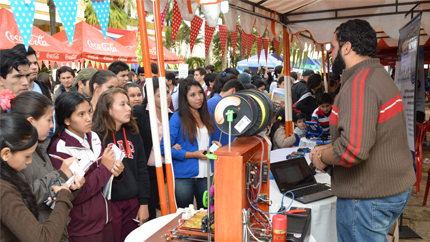December 15, 2015
Paraguayan AEIF Project Concludes with Fourth Science Fair
430x242_paraguay_science_fair.jpg
 Science fair attendees gather around to view a demonstration in Paraguay thanks to a winning AEIF team.
Science fair attendees gather around to view a demonstration in Paraguay thanks to a winning AEIF team.
Each consecutive fair grew in popularity becoming “big tent” events with participants like Amnesty International, local robotics clubs, one computer per child and a local NGO that uses 3D printing to offer affordable prosthetic hands to amputees. The fourth and final of the season attracting well over 8,000 to the main square of farming hub Colonel Oviedo. The original team of 25 Fulbrighters and other USG alumni ended up reaching more than 18,000 people in total.
The "Techauka” fairs took place in Paraguay’s “interior” towns of Caacupe, Villa Hayes, Villarrica, and Coronel Oviedo. Each fair had 40 to 70 booths offering and emphasized hands-on exhibits with tinkerbots, polymers, Tesla coils, 3D printers, recycled material projects, and drones, as well as numerous science fair style activities, and workshops. Alumni wisely secured the support of each town’s municipal government and visits from officials from the Ministries of Youth and Education so that recognized officials opened each fair and paved the way for additional resources, utilities and security. But despite the official embrace, the vibe of each fair was “youth to youth” with young volunteers and alumni teaching and demoing for students of all ages who wanted to know not just about science, but also about educational opportunities in the U.S. like the Fulbright Program, UGRAD, Access and other English micro-scholarships, opportunity grants and USG programs like the Benjamin Franklin Science Corner and Binational Center library offerings. A second focus of the fairs was to help local teachers improve STEM instruction. USG Science Corners and American Spaces staff taught low-cost lab activities easy replicate in rural classrooms.
The overwhelming success of the Techauka fairs resulted in Post applying for funding for transportation and booth rental for two additional fairs slated to take place in March and April of 2016.
